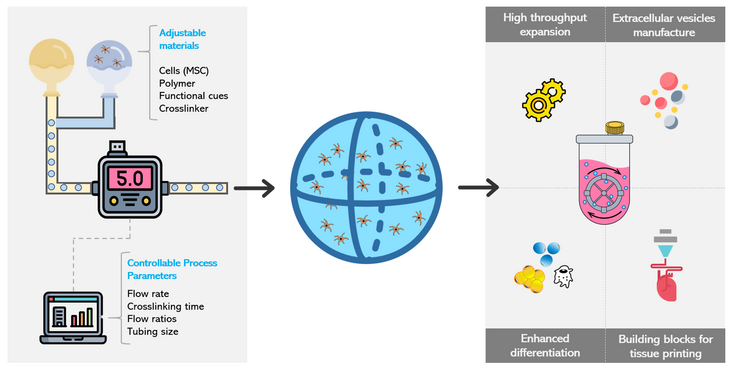Manufacturing of tuneable particulate 3D matrices for hMSC expansion in dynamic cultures
SUPERVISOR: Cornelia KASPER
PROJECT ASSIGNED TO: Oscar GARCÍA
As our understanding on Mesenchymal Stem Cell (MSC) deepens, evidence grows to highlight their functional dependance to minute changes on mechanical and physicochemical cues present on their immediate surroundings. Then, it has become paramount to enable expansion techniques able to adjust the properties of their culturing environment. In this context, different Bioreactors have been designed as platforms suitable to manipulate the expansion parameters: they can be used to induce shear stress, renew nutrients, remove waste, and expose the cells to controlled physical settings, simulating physiological conditions. However, as MSC require a substrate to be attached to, they need either a matrix that emulates a continuous tissue to be placed in a perfusion platform, or a particulate system that emulates conditions of suspension cultures, so that they can be placed in a dynamically controlled Bioreactor.
Microcarriers are the standard choice when it comes to particulate substrates. Unfortunately, the most common approach to expand cells in such systems is through “2 + 1/2D culturing”, meaning that the MSC are grown only on the surface of microbeads. This approach cannot be considered as a fully 3D system, as it just increases the total surface where the cells can adhere, exposing them to high fluid shear stress and hindering free migration of the MSC through the particulate substrate.
Encapsulation of MSC within particulate systems is still costly and limited to small scales, as the technology generally requires microfluidics to be consistent, and several operations to dispense a polymer, form the bead and secure the trapping of the cells. Because of that, with this project we aim to develop a manufacturing method able to produce physically tunable microcarriers, using a streamlined platform that delivers enough material to test in dynamic culturing set ups. A comprehensive characterization of the adjusted properties of the microcarriers and their impact on cell expansion will enable the optimization of manufacturing protocols for robust MSC culture.

